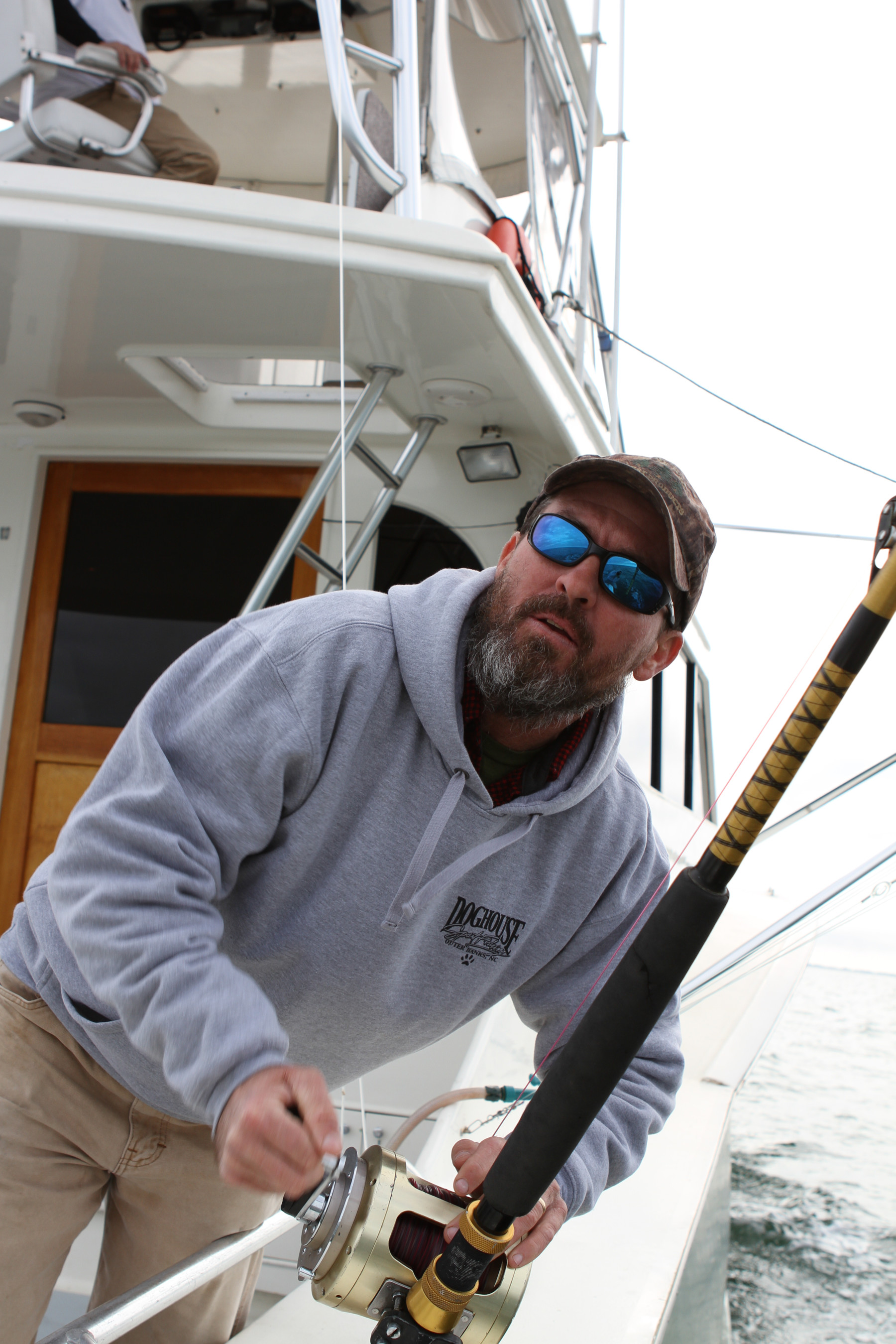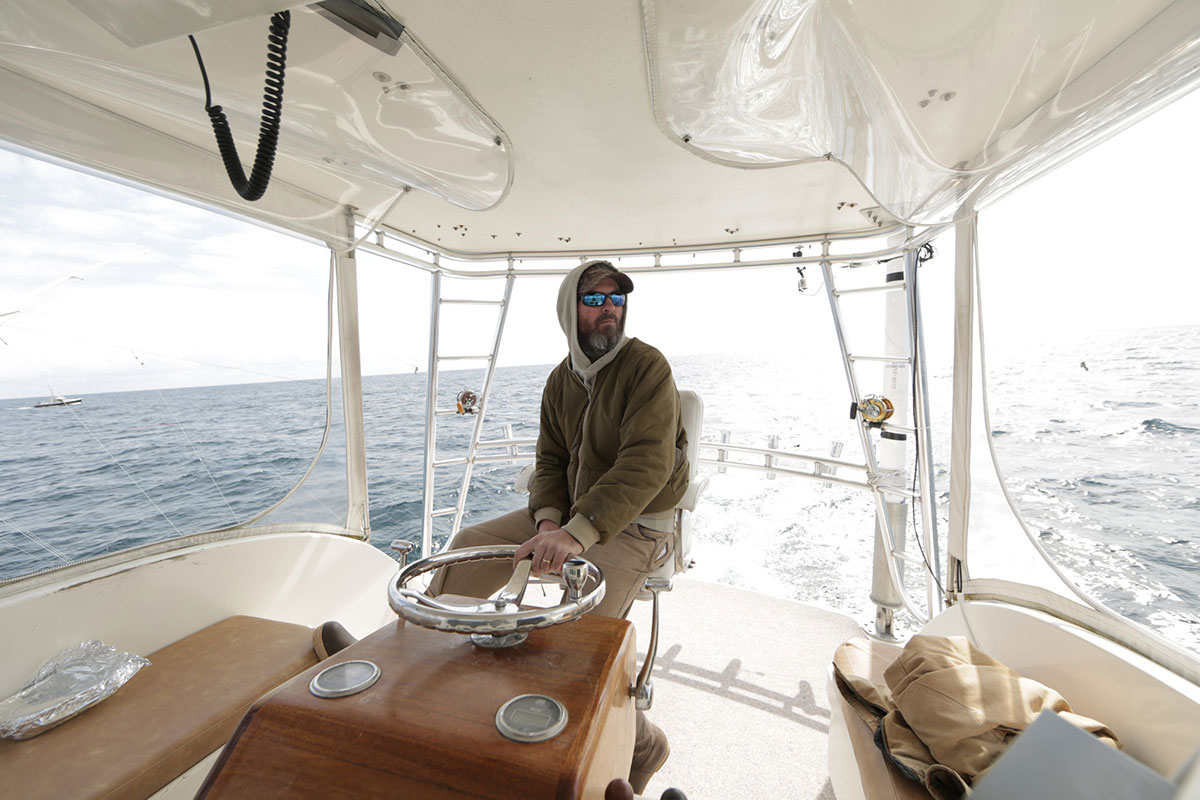While recording the second season of “Wicked Tuna: North vs. South,” a National Geographic Channel reality show, University of Virginia alumnus Capt. Britton Shackelford had to navigate some of the most treacherous water he’d ever dealt with during his quarter-century career in sport and commercial fishing.
A shifting sandbar had silted over the boat channel under the Herbert C. Bonner Bridge on North Carolina’s Outer Banks – the only passage from the safe harbor of the Pamlico Sound to the wild Atlantic Ocean – and winter winds had turned the shallow water wild on outgoing tides.
“It was harrowing trying to get in and out of the ocean from the sound,” Shackelford said. “The whole day when we were offshore chasing tuna, I held this sense of dread knowing that at the end of the trip I was going to have to try to get back inside through that narrow, shallow passageway between the bridge pilings.”
It was so bad during one trip, with heavy fog, low water, and bad winds and currents, Shackelford (known as “Shack”) and his mate, Caine Livesay, along with the show’s cameraman, stayed offshore for four days and nights, fishing and filming, while waiting for the right conditions to make the run back to safe harbor.

Boating a big tuna is “a straight adrenalin shot to the jugular,” UVA alumnus Britton Shackelford said. (Photo credit: National Geographic Channels)
A native of Gloucester, Virginia, Shackelford is a 1990 UVA graduate with a degree in rhetoric and communication studies. His family has been harvesting Chesapeake Bay seafood since 1670. He grew up crabbing, oystering and fishing.
“I’ve always loved being outdoors,” he said.
The first male in his family to graduate from college, Shack struggled academically during his first year at the University, but got it together by his second. His father told him to either go to school and do it right, or get it over with. He got it right.
On the side he started working as a horse groomer and general hand at Keswick Hunt Club and met the likes of Hollywoodites Sissy Spacek and Sam Shepard, among others. The outdoor work helped him find his groove in class.
“I spent a lot of time outside, and riding, and it helped me out in a lot of ways,” he said. “I started liking my classes, and I got into it.”
By the time he graduated, a friend introduced him to the sportfishing fleet at Oregon Inlet. He worked a summer as a mate and came to realize that ocean fishing is what he wanted to do.
“It’s a dynamic, exciting, competitive environment, and I’m highly competitive,” he said. “Boating big fish is a straight adrenalin shot to the jugular. I enjoy coming in at the end of the day with the catch, and seeing all the people standing around the docks looking to see what you caught.”
Shack met an Outer Banks woman named Audra Meads, whom he married, and together they’ve had three children and built a flourishing charter and commercial fishing business. Shack’s boat, the Doghouse, a 61-foot, custom-built Carolina sport fisherman, is well-known to regular viewers of “Wicked Tuna” and to the hundreds of clients who fish with him each year out of the Outer Banks Marina in Wanchese.
A few years ago, when “Wicked Tuna” producers came to the Outer Banks looking to do a show, they auditioned several boat captains in the area, seeking a combination of colorful character, good humor, good sense and good fishing skills. Shack didn’t apply.
“I’d seen a clip of ‘Wicked Tuna’ on TV, filmed up north, and I didn’t like some of the language and behavior I saw, so I wasn’t really interested,” he said.
But when one captain was dismissed from consideration for the show after a vetting, the producer came to Shackelford.
“My wife and I did a substantial amount of prayer, whether I should be on the show or not, and we decided it was a good opportunity to present fishermen in a positive way, and the positive, Christian lifestyle I try to live,” he said.

Shackelford’s boat, Doghouse, is instantly recognizable to “Wicked Tuna” viewers and to the legions of fishermen who clamber aboard for charters in the summer.
“Not one of my best moments,” he said, “but there are several cameras on me at any given time in the cockpit, and I’m mic'd up, but sometimes I forget. I risked the hypocrite factor.”
As Shackelford has continued his fishing career, both commercially and in sportfishing, he has become “political,” he said. Commercial and sport fishing interests often are at odds with each other – each vying for essentially the same resources – but Shackelford believes there is a middle ground where the two sides can work together to protect the resources. They are all facing a changing environment that includes declining water quality, declining stocks of some species and changing regulations.
Shack serves as president of North Carolina Watermen United, a representative organization for people in that state who earn their livelihoods by fishing. The group seeks to ensure fair regulations for both commercial and professional sport fishing interests and to protect their “freedom to fish.”
“We’re working for common-sense, intelligent ways to protect the resource and make sure there’s a viable future for us,” he said. “A perk of the show is that it gives me an opportunity to get out and discuss fisheries management issues. I feel I’ve been blessed.”
Media Contact
Article Information
February 11, 2016
/content/alumnus-takes-yanks-wicked-tuna-reality-show

